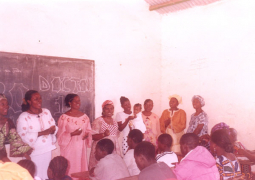Stakeholders from various institutions recently gathered at the hall of the National Nutrition Agency (NaNA) for a day validation of the report of the National Nutrition Survey.
The report was made possible through using the standardized monitoring and assessment of relief and transition (SMART) method.
The report was conducted by NaNA, in collaboration with other line ministries, who shared the findings with key stakeholders to discuss and adjust any necessary recommendations and suggestions for a better report.
The forum, geared towards bringing various stakeholders together to make input into the findings, was funded by UNICEF.
Speaking at the forum, Aichatou Diawara Flambert, UNICEF Country Director, said the National Nutrition Survey, which used SMART method, was conducted in The Gambia from 3 September to 3 October 2012.
She said the overall objective of the survey was to determine the prevalence of the nutritional status and mortality among children under five years old in the local government areas.
Undertaking the SMART survey was a significant milestone in nutrition surveillance in The Gambia, she said.
“It has provided data from a national representation sample and has made our nutrition data comparable to other countries in the West African region,” she said.
More significantly, she noted, it has provided data to assess the prevalence of global acute malnutrition per local government area.
The UNICEF country boss stated that the result of the survey shows that The Gambia, at the time of the data collection, had a national global acute malnutrition prevalence of 9.99 per cent with more boys than girls being malnourished and a prevalence of severe acute malnutrition of 1.2 per cent.
She further outlined UNICEF’s commitment and willingness to continue its support to NaNA and the Ministry of Health to reduce the global and severe acute malnutrition rates in the country.
She then used the opportunity to thank the executive director of NaNA and his team for their effort at ensuring the activity was successful.
For his part, the deputy executive director of NaNA, Malang N. Fofana, expressed delight at the positive response of the various stakeholders to the validation of SMART report.
According to him, the main objective of the SMART survey was to determine the prevalence of acute malnutrition including prevalence of bilateral oedema of children from 6 to 59 months and the prevalence of chronic malnutrition and underweight of children from O to 59 months.
The survey was designed as a cross-sectional household survey using a two-stage random sample representative at the local government area level, he added.
He said that based on the finding of the national nutrition survey, the recommendations made state that the national nutrition survey should be institutionalised as an annual activity; be strengthened and expanded on the implementation of proven community and health facility based on nutrition intervention across the country, and focused on targeting acute and chronic malnutrition.
“It further recommends the need for review guidelines and protocol on the management of malnutrition at community and health facility levels, reinforcing nutrition programes focusing on women and advocating and mobilizing resources to support integrated nutrition and health programmes,” he said.




